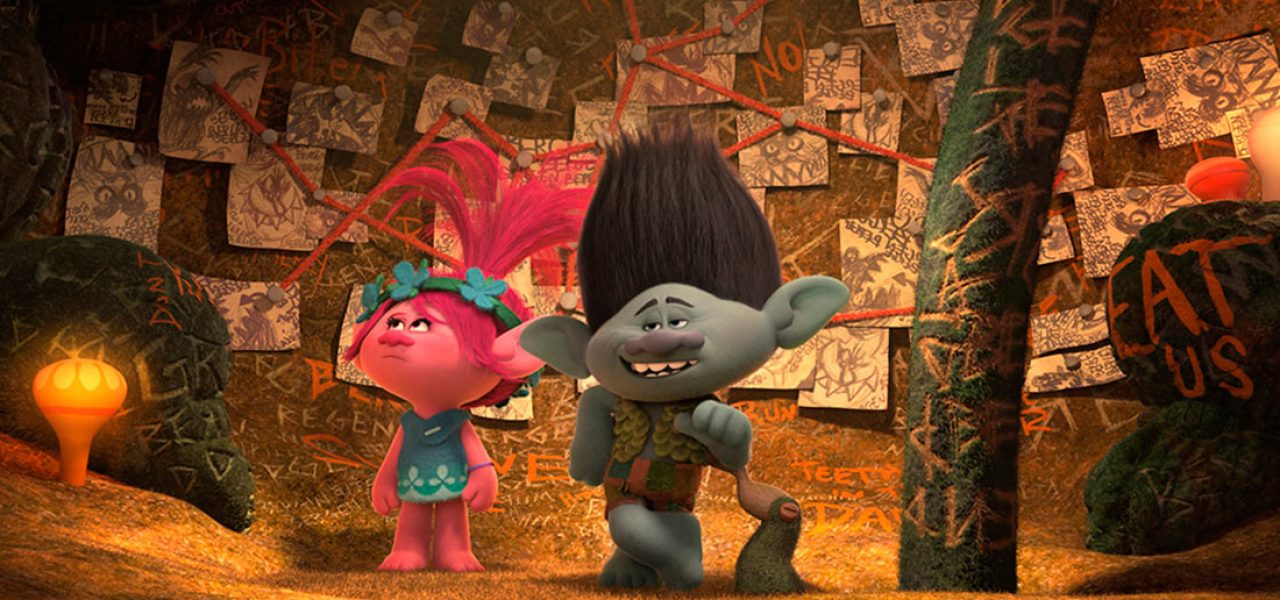
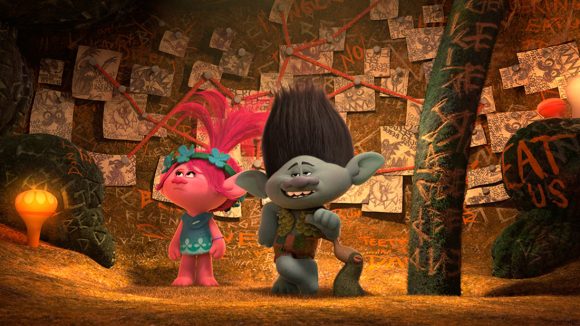
‘Trolls’ Director Mike Mitchell: There Was No Mythology to These Things…I’ve Never Felt So Free
Few directors can say that they have a completely open slate when it comes to crafting an animated feature. But that’s what Trolls director Mike Mitchell and co-director Walt Dohrn experienced at least to some degree when DreamWorks Animation acquired the film rights to the famous Troll Dolls franchise and pushed forward with a feature film.
What would the story be? Who were the characters? None of these aspects existed in the franchise, which was based on a hugely popular decades-old line of toys. So Mitchell and Dohrn and the team at DreamWorks had to work it out, while also seeking to avoid obvious toy tie-ins and preserving a handmade look to the film despite it being rendered in cg.
Cartoon Brew sat down with the directors recently at the VIEW Conference in Italy to find out how they tackled Trolls.
Cartoon Brew: The Troll Dolls were first popular in the 1960s, so why make a movie about them now?
Mike Mitchell: Well, what was exciting was that there was no mythology to these things. Not even a character.
Walt Dohrn: Having no characters was really exciting.
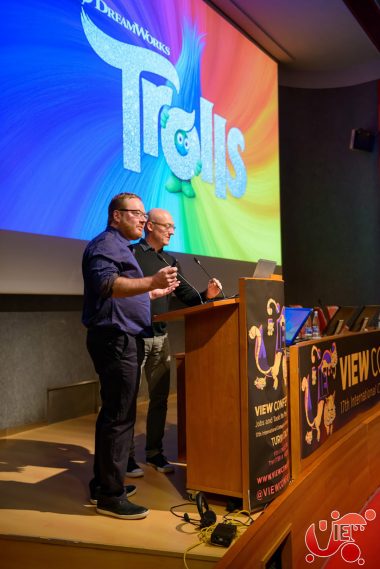
Mike Mitchell: For a studio to own a property where nothing is attached—I’ve never felt so free. Not only did we get to do everything we wanted to do, we got to give it the tone we wanted, we got to create our own world, we got to put in all of our inspirations like [Hayao] Miyazaki and Adventure Time and Jim Henson.
Walt Dohrn: I think it got the artists excited, too. That’s why we got such beautiful work. A lot of times they have to work on sequels, which are fun and great challenges, but to have nothing there and create something out of nothing is every artist’s dream.
Mike Mitchell: It also helped because [LEGO Movie co-director] Phil Lord came in and gave us notes. We got notes from everyone – we brought in Genndy Tartakovsky, Teddy Newton, Paul Tibbitt.
Walt Dohrn: Animation is such a small community, and we’re always reaching out to friends.
Mike Mitchell: I’ve worked with all these people, so why not? It’s like payback. It’s like, ‘You’ve had me on your film, help me on our film.’ Specifically, I was inspired by Phil Lord and Chris Miller—they made a LEGO film that has nothing to do with any toy. You don’t even consider that at all. You just go to the film and you enjoy it. It also helps that Trolls is a way older property. Kids don’t know it. It’s brand new to them. As parents, we know it.
Walt Dohrn: Just barely—people remember twisting the hair on those pencil ends.
Mike Mitchell: That’s all people remember!
Even though it’s new to many people, why do you think these Trolls have lasted so long as a property?
Walt Dohrn: I really think people love that hair.
Mike Mitchell: Yes, as a bald man, and I’m sad to admit it, that was the discovery I made.
Walt Dohrn: It was funny, we saw this gorilla footage. What was his name?
Mike Mitchell: The gorilla’s name was Foxy.
Walt Dohrn: Foxy had a therapy troll and he would twist the hair. And I think that’s it—any time you give someone a Troll doll they would twist the hair. And that’s why it has lasted.
Mike Mitchell: They are ‘ugly cute’—and you can’t say that about many characters. Usually in animation it’s ‘cute cute’, or ‘ugly.’
Walt Dohrn: Yeah we liked that porkyness.
Mike Mitchell: I think it doesn’t hurt that they’re naked too.
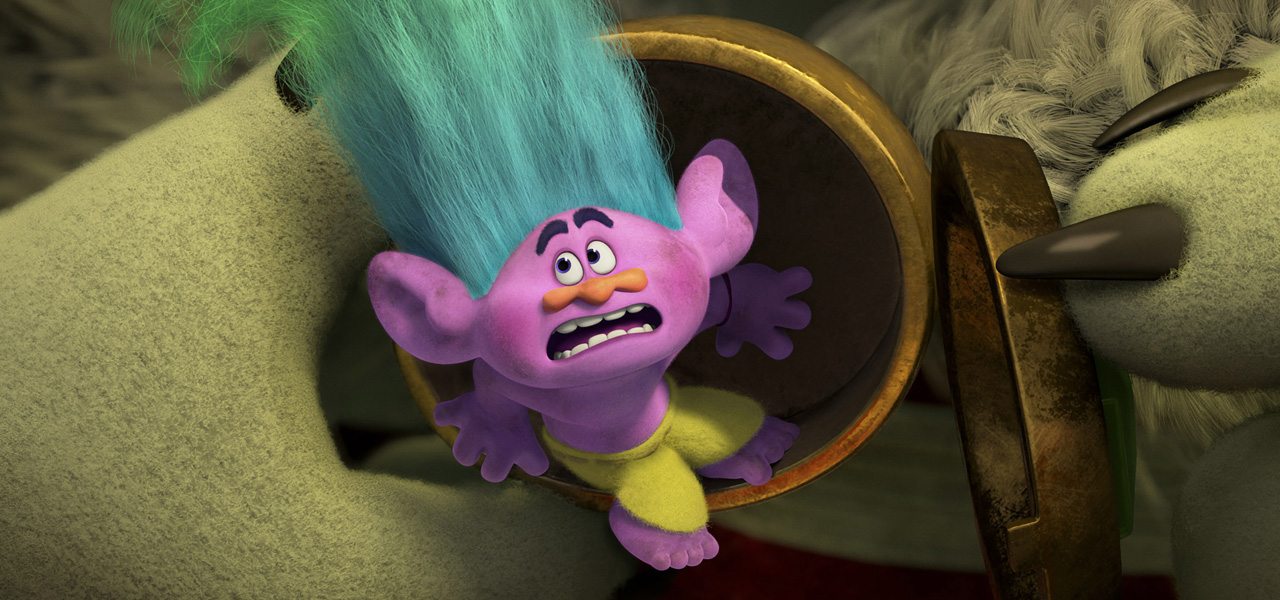
So, you didn’t have to adhere to an existing story. Then how do you even start to come up with one?
Mike Mitchell: It helped that we could work with our friends, Jonathan Aibel and Glenn Berger, who wrote the Kung Fu Panda franchise. I’d worked with them on Sky High, and we just have a short-hand with them. Walt and I had a loose idea that we wanted to explore happiness. We thought it would be great with a positive character and a negative character.
Walt Dohrn: Already that starts to inspire a story, just those ideas.
Mike Mitchell: Yeah, the contentious chemistry of these two characters. I love Romancing the Stone, this film that a lot of people have forgotten about from Robert Zemeckis. It’s just an amazing way to explore two characters’ points of view towards the world. So we started there and the writers had the huge challenge that Walt and I were in love with this character named Bridget. It’s this little potato-shaped monster played by Zooey Deschanel, and we said, ‘This girl belongs in the film and she has to be a part of the film no matter what.’
I think it’s a similar story to the snowman [Olaf] in Frozen. The writer inherited that, and she said she hated the snowman! But she figured out a way to make it work. Aibel and Berger did the same thing with Bridget. They said, ‘She doesn’t fit!’ and we said we would make her fit and we figured it out together.
Walt Dohrn: We got in trouble a lot because she would take over the story.
In cg you can do almost whatever you want, but at times this film feels almost handcrafted. How did you try to create that feel?
Mike Mitchell: Well, early on we got told that our storytelling seemed handcrafted, as if we were just in a garage riffing on the movie. That was like a compliment to us.
Walt Dohrn: It was like a bunch of buddies got together to make this thing. That was the first six months, and two and a half years later we tried to hang onto that.
Mike Mitchell: So in the design of the world and the characters we thought, ‘Let’s keep this as natural as we can.’
Walt Dohrn: Mike and I went to school together and we are not technicians, we are trained in story and characters. We still draw on paper! We totally love digital technology, but there’s something really great about the handmade feel to everything.
What were some of the things that you wanted to keep handmade looking?
Mike Mitchell: If there’s any flashback or when a Troll reports history, they scrapbook it. It goes into this whole world where we had this amazing artist, Priscilla Wong, who really cut out scrapbook stuff and used glue and glitter.
Walt Dohrn: It’s funny, the glitter would just go everywhere and last forever. It would be in your eyebrows three days later. But we actually used all those cutouts and animated them in After Effects after photographing them. The whole look of the world has that fiber-art look.
Mike Mitchell: We also made models in the planning process. That was to explore, to see how light would impact on things.
Walt Dohrn: I think they also scanned a lot of those textures in and used them.
Mike Mitchell: I’ve got to give it to [production designer] Kendal Cronkhite who really took that handmade feel further. It was a loose idea we had and she just took it further and further than what I thought was possible. I didn’t know she’d be able to make fire with the hair. I didn’t know the effects could be done with natural fibers. I was like, ‘Are you sure, Kendal, that a rock can be felted?’
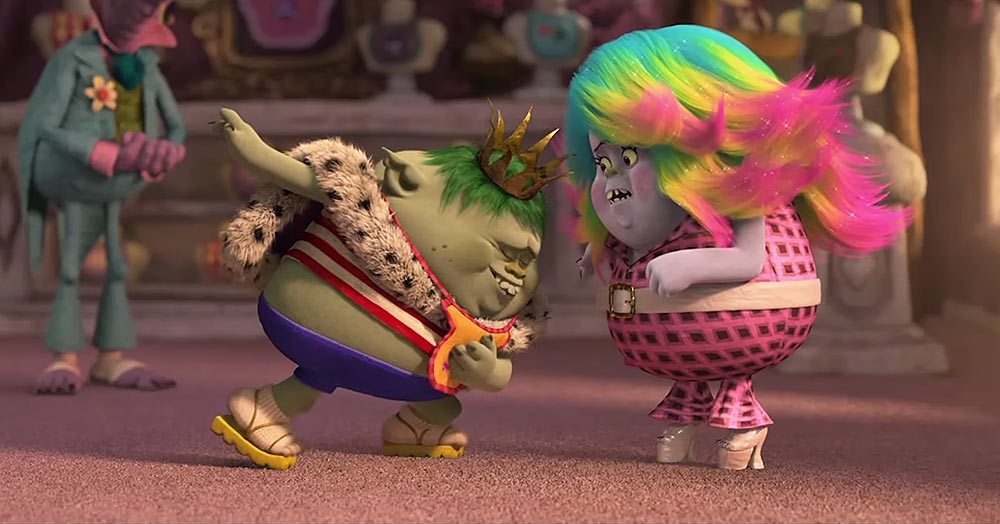
There’s a look like that on the characters too—a felt look—how was that done?
Mike Mitchell: I described it like a gummy bear that had been flocked in velvet.
Walt Dohrn: There were times when we were watching it early on and we thought, ‘Woah, we’re going to have to scale back on that.’ We started thinking ‘hand of God’ stuff, like, ‘Is there someone who made this?’ It feels so handmade. In 3D we actually call it our ‘fuzzy immersion’—it feels so tactile.
Did your tech team members get nervous about having to replicate that look in cg?
Walt Dohrn: Yes, they hate us at first! And maybe when they’re trying to finish as well.
Mike Mitchell: But every challenge—they met. And you can tell they get inspired by having to do all the crazy stuff with the Troll hair. At one point, all the Trolls climb up onto this sad monster’s head and they want to help her have a date with the king. They grow their hair and make this giant Farrah Fawcett wig. It was hugely complicated but by the end, the effects artists really have ownership of that challenge and have pride about finishing it.
Lastly, let’s talk about the songs – one of the fun ones comes when Anna Kendrick as Poppy sings “The Sound of Silence” to Justin Timberlake’s character, Branch. How did that scene come about?
Mike Mitchell: That was definitely inspired by Ernie and Bert from Sesame Street. They have a camping scene where Bert wants to go to sleep and Ernie is like, ‘Hey Bert, do you hear that?’ We just wanted to explore that idea where one of them wants to go to bed and the other wants to stay up.
Walt Dohrn: There are always these campfire scenes in movies and we thought, ‘How do we infuse this with a different energy, with a song?’ And what song could it be? And then at one point we just turned to each other and said “Sound of Silence!”

.png)